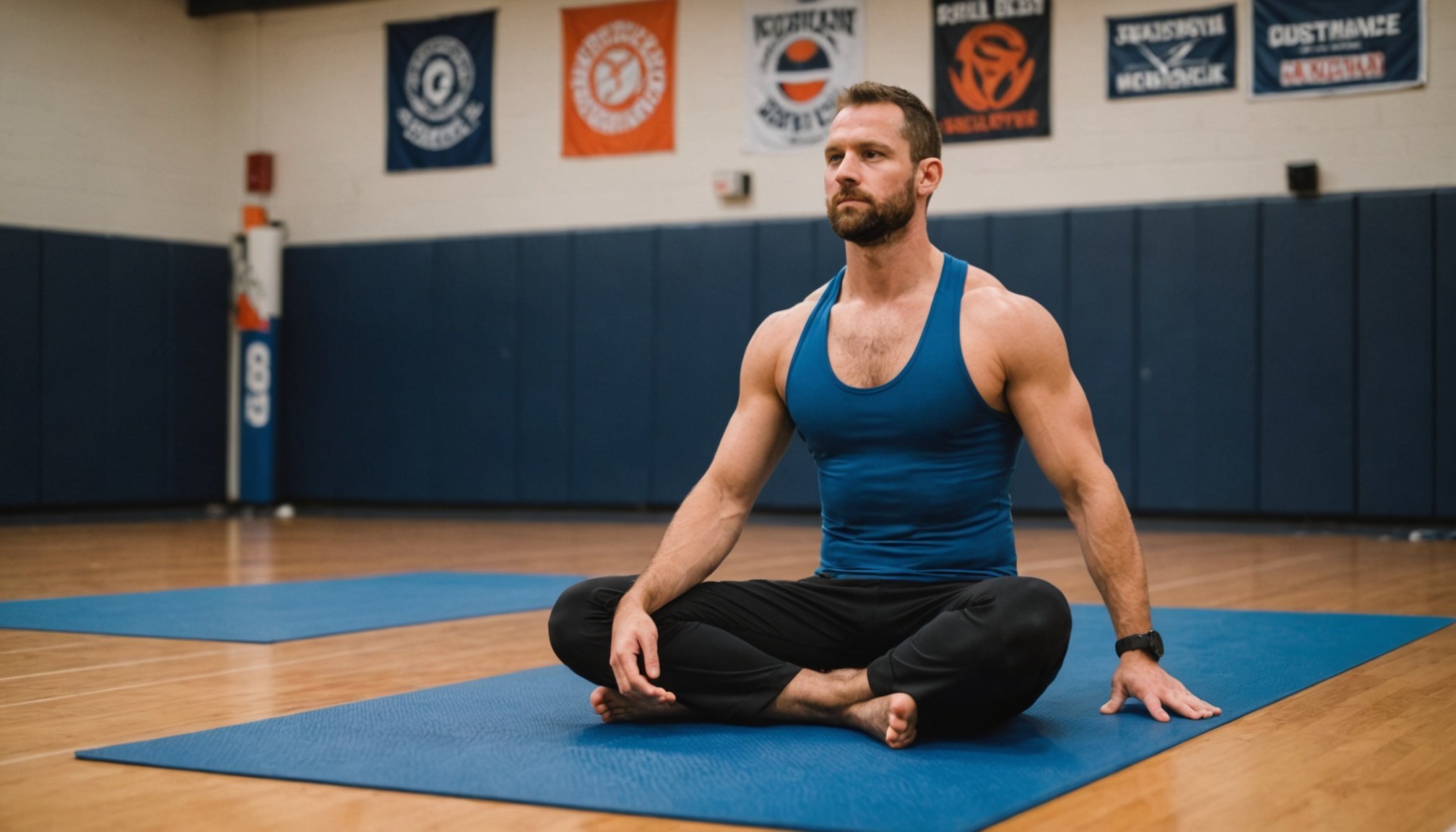Unlocking Peak Performance: The Advantages of Adding Yoga to Your Wrestling Training Routine
Why Yoga Matters for Wrestlers
When it comes to wrestling, athletes are constantly seeking ways to enhance their performance, build strength, and improve their overall fitness. While traditional strength training and conditioning are crucial, incorporating yoga into your training regimen can be a game-changer. Here’s why:
Enhanced Flexibility and Mobility
Yoga is renowned for its ability to increase flexibility and mobility, which are essential for wrestlers. The dynamic movements and postures in yoga help to stretch and strengthen the muscles, tendons, and ligaments, allowing for a greater range of motion. This flexibility is particularly beneficial in wrestling, where athletes need to be able to move quickly and fluidly in various directions.
Also read : Top Strategies to Combat Athlete Fatigue During Multi-Day Competitions
For example, the “Salutations au Soleil” (Sun Salutations) in yoga involve a series of flowing movements that warm up the body, stretch the muscles, and improve circulation. These exercises can help wrestlers maintain or even increase their flexibility, reducing the risk of injuries and improving their overall athletic performance[3].
Building Strength and Endurance
While yoga is often associated with relaxation and flexibility, it can also be a powerful tool for building strength and endurance. Certain yoga practices, such as Vinyasa Flow or Ashtanga, involve high-intensity sequences that can help athletes build muscular strength and endurance.
Also to read : Unlocking Performance: The Advantages of Altitude Training Masks for Sprinters
“Yoga has helped me tonify my muscles and develop a greater awareness of my body,” says a wrestler who integrated yoga into his training. “The dynamic sequences have improved my strength and endurance, which has been invaluable on the mat”[3].
Improving Mental Focus and Conditioning
Wrestling is as much a mental sport as it is physical. The mental toughness and focus required to perform at a high level can be just as demanding as the physical aspects. Here’s how yoga can help:
Reducing Stress and Anxiety
Yoga is well-known for its stress-reducing benefits. By incorporating yoga into your training routine, you can better manage stress and anxiety, which are common among athletes. The practice of yoga involves conscious breathing and meditation techniques that help calm the mind and reduce cortisol levels.
“Yoga has been a lifesaver for me in terms of managing stress,” notes another athlete. “After a tough practice or competition, yoga helps me unwind and recharge, both physically and mentally”[2].
Enhancing Mental Clarity and Focus
Yoga also improves mental clarity and focus through its emphasis on mindfulness and concentration. The practice requires athletes to be fully present in their bodies, which can translate to improved focus during matches.
“During a fight, it’s easy to get distracted by the crowd or your opponent’s moves. But with yoga, I’ve learned to stay focused and present, which has significantly improved my performance,” explains a wrestler who practices yoga regularly.
Injury Prevention and Recovery
Injury prevention and recovery are critical components of any athletic training program. Here’s how yoga can help:
Balancing Muscle Groups
Yoga helps balance the muscle groups in the body, which is particularly important for wrestlers who often develop imbalances due to the repetitive nature of their training. By strengthening and stretching all muscle groups, yoga can reduce the risk of injuries.
For instance, yoga postures like the “Warrior Pose” and “Triangle Pose” target multiple muscle groups simultaneously, helping to maintain balance and reduce the risk of overuse injuries[3].
Enhancing Circulation and Recovery
Yoga also improves blood circulation and aids in recovery. Certain postures and breathing techniques help increase oxygenation of the body and brain, which can speed up the recovery process after intense training sessions.
“Yoga has helped me recover faster from tough practices,” says a wrestler. “The improved circulation and relaxation techniques have made a significant difference in how I feel the next day”[3].
Practical Tips for Incorporating Yoga into Your Training Regimen
Here are some practical tips to help you integrate yoga into your wrestling training routine:
Start Slowly
- Begin with short sessions of 10-15 minutes and gradually increase the duration as you become more comfortable with the practice.
- Start with gentle yoga styles like Hatha or Yin Yoga before moving to more dynamic styles like Vinyasa Flow.
Focus on Key Postures
- Incorporate postures that target the major muscle groups used in wrestling, such as the shoulders, back, and legs.
- Use postures like “Downward-Facing Dog” and “Plank Pose” to build strength and endurance.
Use Breathing Techniques
- Practice conscious breathing techniques to improve focus and reduce stress.
- Use techniques like “Alternate Nostril Breathing” and “Belly Breathing” to calm the mind and prepare for competition.
Make It a Habit
- Incorporate yoga into your daily routine, ideally at the same time each day.
- Use yoga as a warm-up or cool-down to your regular training sessions.
Detailed Benefits of Yoga for Wrestlers
Here is a detailed list of the benefits yoga can offer to wrestlers:
- Improved Flexibility and Mobility: Increases range of motion and reduces the risk of injuries.
- Example: Sun Salutations and Warrior Poses.
- Building Strength and Endurance: Enhances muscular strength and endurance through dynamic sequences.
- Example: Vinyasa Flow and Ashtanga Yoga.
- Reducing Stress and Anxiety: Helps manage stress and anxiety through conscious breathing and meditation.
- Example: Yoga Nidra and Restorative Yoga.
- Enhancing Mental Clarity and Focus: Improves focus and mental clarity through mindfulness and concentration.
- Example: Meditation and Pranayama practices.
- Injury Prevention: Balances muscle groups and improves circulation to reduce the risk of injuries.
- Example: Balancing postures like Tree Pose and Eagle Pose.
- Enhancing Circulation and Recovery: Aids in recovery by improving blood circulation and oxygenation.
- Example: Inversions like Headstand and Shoulder Stand.
Comparative Table: Yoga vs Traditional Strength Training
Here is a comparative table highlighting the benefits of yoga versus traditional strength training for wrestlers:
| Benefit | Yoga | Traditional Strength Training |
|---|---|---|
| Flexibility | Increases flexibility through dynamic movements | Limited focus on flexibility |
| Strength | Builds strength through isometric holds and dynamic sequences | Focuses on building strength through weights and resistance |
| Endurance | Improves endurance through sustained postures and flows | Improves endurance through high-intensity interval training |
| Mental Focus | Enhances mental clarity and focus through mindfulness | Limited focus on mental aspects |
| Injury Prevention | Reduces injury risk by balancing muscle groups and improving circulation | May increase injury risk if not balanced properly |
| Recovery | Aids in recovery through improved circulation and relaxation | Limited focus on recovery techniques |
Quotes from Athletes and Experts
Here are some quotes from athletes and experts that highlight the benefits of yoga for wrestlers:
- “Yoga has been instrumental in my wrestling career. It has improved my flexibility, strength, and mental focus, allowing me to perform at a higher level.” – Wrestler who practices yoga regularly.
- “The mental toughness and focus that yoga provides are invaluable for athletes. It helps them stay calm under pressure and perform better in high-stress situations.” – Sports Psychologist.
- “Yoga is not just about physical postures; it’s about mental discipline and focus. It has helped me become a better wrestler and a more balanced individual.” – Wrestler who incorporates yoga into his training.
Incorporating yoga into your wrestling training routine can be a powerful way to enhance your athletic performance, build strength and endurance, and improve your mental focus. By understanding the benefits of yoga and how to integrate it practically into your training, you can unlock peak performance and achieve your goals in the sport.
Remember, yoga is not a replacement for traditional training but a complementary tool that can help you become a more well-rounded and resilient athlete. So, take the first step, roll out your mat, and discover the transformative power of yoga for yourself.










